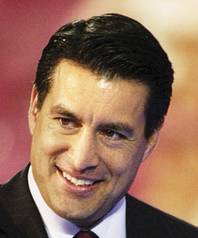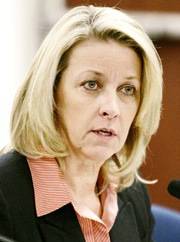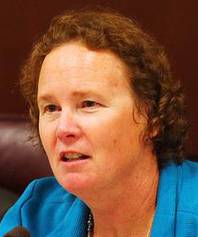Sunday, March 6, 2011 | 2 a.m.

Brian Sandoval

Sen. Barbara Cegavske, R-Las Vegas

Sheila Leslie
Sun archives
- Republicans issue list of demands to be met before they'll talk taxes (3-3-2011)
- Democrats say Sandoval budget has $325 million hole (2-24-2011)
- Sandoval’s budget relies on at least one fee increase (2-10-2011)
- Gaming, mining industries become early targets for taxes (2-8-2011)
- Sandoval will need to write in loophole to pass budget (2-5-2011)
- Senior programs not spared from cuts in Sandoval budget (2-2-2011)
- Gov. Brian Sandoval’s budget means job, service cuts for Clark County (1-26-2011)
- State budget plan heavy on cuts, light on solutions (1-25-2011)
- Soft words during State of the State hide Nevada in pain (1-25-2011)
- Teachers not pleased with most of Sandoval’s speech (1-25-2011)
- In response, Democrats say taxes might be part of budget solution (1-24-2011)
- State of the State: How doors could open for Nevada (1-24-2011)
- Is Brian Sandoval’s ‘shared-sacrifice’ budget the solution to state’s economic woes? (1-23-2011)
- Most vulnerable await budget cuts with trepidation (1-23-2011)
- Increasingly worried liberals seek pushback on Sandoval budget (1-21-2011)
- Construction industry: Raise taxes for job growth (1-20-2011)
- Groups seek higher taxes on tobacco and gasoline (1-20-2011)
- Sandoval warns of consolidation, job losses in state government (1-19-2011)
The Legislature gets its daily dose of misery as staff explains the governor’s budget to lawmakers during committee hearings.
A couple of weeks ago, lawmakers spent about 10 minutes discussing Gov. Brian Sandoval’s proposal to eliminate eyeglasses for the poor, elderly and disabled. They would still be able to see a doctor and get prescriptions, but would be out of luck — and money — in purchasing the glasses. The state can’t afford the program.
The question legislators went back and forth on was: What now?
There are 7,833 Nevadans whose eyewear is paid for by the state Medicaid fund. Would they wander the streets squinting? Would their families, neighbors, a benevolent casino or corporation step up instead? Would nonprofit groups, churches or volunteer groups pick up the slack, as Republicans, including lawmakers and Sandoval, and libertarian groups suggest?
Nevada is about to find out.
Sandoval’s budget fulfills his campaign promise not to raise taxes, and thus it brings plenty of cuts — to schools, universities and colleges and human services. He calls these “tough decisions” the state is forced to make to keep taxes low and maintain a friendly business climate.
In the case of the eyeglasses, it’s one of the few programs Nevada provides that is considered “optional” by the federal government. It’s a small example — just $1.7 million of the $270 million in proposed cuts in health and human services — but one that provides a window onto the debate over what people should expect government to provide versus what they should look to the private sector, nonprofit groups, churches or family for.
Sen. Barbara Cegavske, R-Las Vegas, asked during the meeting: What about the nonprofit or volunteer groups such as the Lions Club? Can’t they provide the eyeglasses?
It’s a nearly $4 million program when you include federal funding, Sen. Sheila Leslie, D-Reno, said. “I don’t think charities can accommodate all those people.”
Charles Duarte, state administrator for Medicaid, said it would reach out to nonprofit groups, but “there are going to be people who won’t have eyeglasses.”
After the meeting, Leslie shook her head at what she sees as an increased belief among lawmakers that someone other than the state will provide services that get cut. “It’s a fantasy to think that charity will cover glasses for 7,833 people,” she said.
But she said she is hearing it more this session than ever before. “We know there are going to be gaps,” she said. “It’s more comfortable thinking that churches or nonprofits will take care of people, instead of thinking of the poor people.”
Sandoval and his wife, Kathleen, have suggested the private sector will have to step up to fill gaps left by the state. That call has been echoed by Republican lawmakers on everything from mental health services to early childhood education.
It’s unclear what beyond faith in people’s goodwill and corporate citizenship supports that belief.
So is Nevada headed to a scene out of Dickens where orphans beg for alms? Or is this a state that will embrace the Amish ideal of the community rallying to neighbors’ barn-raisings?
•••
Tad DeHaven would like to make something clear: He does not want children to starve. He gets accused of just that as a budget analyst with the Cato Institute, a libertarian think tank in Washington.
He wants limited government. He wants the public sector to provide fewer services. But he isn’t without a heart. He says there’s a better way than government.
“Ideally, we’d have more nonprofit, more private-sector involvement taking care of those in need,” DeHaven said. “Starting at the federal level on through to the state and local government level, it’s not a very efficient, effective model. The closer you can place the person in need with the person providing the service, the better you can tailor that assistance to one need.”
If the goodwill of donors were the source of services, the provider would be more accountable for money spent on salaries and pensions. The benefactors would not tolerate fraud and waste. People wouldn’t lazily comfort themselves with the belief that government is there as a backstop. They would feel more responsibility to volunteer time and money to help their neighbors.
This might seem, on its face, like an overly optimistic vision of humanity with fewer social constructs. But Nevada policies, particularly within the Republican Party, are being driven by like-minded libertarians and conservatives.
The Nevada Policy Research Institute, a libertarian think tank, is increasingly cited by Republicans, from lawmakers to Sandoval, to support their policies.
Geoffrey Lawrence, deputy director of the Nevada Policy Research Institute, said state social services have grown beyond the scope of providing “critical or emergency care services.” Asked about the eyeglasses, he said, “I don’t think that item is consistent with the principles of limited government. I guess there’s a consensus we don’t want to see people dying in the street, and we should provide critical emergency coverage. But I don’t see how that fits in.”
Most Republicans see these cuts as “tough choices” to avoid raising taxes, which they argue will depress the economy.
They argue there are others who will help.
Kathleen Sandoval, a senior executive at the nonprofit Children’s Cabinet in Reno, which provides services to troubled youth, has defended her husband’s budget cuts. The state can’t be all things to all people, and nonprofit groups need to get creative, she said.
•••
That worldview is “at best, wishful thinking. At worst, it’s severely disconnected from reality,” said Jon Shure, deputy director of the state fiscal project at the Center on Budget and Policy Priorities, a progressive think tank.
Nonprofit groups have been hit by the same recession as government and private businesses. “To believe that if government got out of the way, disappeared or shrunk, people would step up suggests a level of faith totally unwarranted by history,” he said.
And he warned against idealizing the past. Sure, in the good old days, some neighbors helped put up barns. But some neighbors didn’t get help if they were the wrong race or from the wrong country.
This is being debated nationally, experts said. As state governments look at cutting services, elected officials are leaning on nonprofit groups to provide services.
But donations to nonprofit groups are down while demand for their services has increased, said David L. Thompson, vice president of public policy for the National Council of Nonprofits. Inevitably people will fall through the cracks.
“It’s not fair to assume nonprofits will pick up all of the slack,” he said. “Whose fault is that? Let your readers decide.”
No studies have been done on what happens with charities and social services during a sustained recession.
“The study doesn’t exist,” he said. “Everyone is interested in better data. I expect we will have that after this recession.”
Until then, we have to look at each case and figure out the best path.
Right now, nonprofit groups and governments are intricately linked. States provide much of the funding, and nonprofit groups execute the programs. In 2008, the last year for which data are available, about 60 percent of funding for Nevada nonprofit groups came from federal, state or local government contracts or grants.
“We can step up, pick up the slack,” said Phil Johncock, interim executive director of the Alliance for Nevada Nonprofits. “But there’s a certain point where you can’t. You can only stretch so far.”
Nonprofit groups got 29 percent of their funding from contributions, gifts and grants; 11 percent came from other sources, such as special events, goods sold and fees paid by those who use services.
Johncock said because of the recession, donors have less discretionary money. Corporations have less money to give.
“The safety net exists, but it exists largely because the state created it,” said Dana Serrata, executive director of Helping Hands of Vegas Valley, a nonprofit organization that provides poor seniors with transportation, a food pantry and respite for their caretakers. “When the state was prosperous it gave grants out.”
Helping Hands has worked to decrease its reliance on government grants. A few years ago, about 95 percent of its funding came from government. The state’s contribution is down to 70 percent, and the group is looking to make it lower.
On Valentine’s Day it started a new fundraiser, “Feed a Pig, Help a Senior” — piggy4seniors.org — where people can adopt a ceramic pig to raise money.
They’re trying to close an $83,000 budget deficit this year because of last year’s state cuts. (They haven’t been able to get a straight answer on the effects of Sandoval’s proposed cuts, she said.)
So far, the group has raised $4,100 toward its $100,000 goal. That includes $500 from a barbecue last week.
•••
The Lions Clubs, a volunteer group, would love to step in if the state cuts its eyeglasses program.
They do yeoman’s work. With doctors, surgeons, ophthalmologists and optometrists volunteering, the Lions Club’s SightFirst Foundation of Southern Nevada sees about 100 to 110 people a month. It gives either free or greatly reduced prices on exams and procedures.
LensCrafters gives the organization vouchers for 1,000 eyeglasses a year. Other stores provide eyeglasses at steep discounts.
“This community, even though it takes a lot of heat, does pull together,” said Ken Richardson, president of Lions SightFirst Foundation of Southern Nevada. “People understand what’s happening with the state budget. We’ll jump in and help out and try to meet that need.”
Can they fill the gap if the state ends its eyeglasses program?
“It would be a challenge,” he said.
Noni Rybka, program director for the Lions SightFirst Foundation, was enthusiastic about the opportunity.
“We have the capability to provide services to thousands,” she said. “We are limited only by our finances.”
It’s the same limitation everyone is struggling with.

Join the Discussion:
Check this out for a full explanation of our conversion to the LiveFyre commenting system and instructions on how to sign up for an account.
Full comments policy